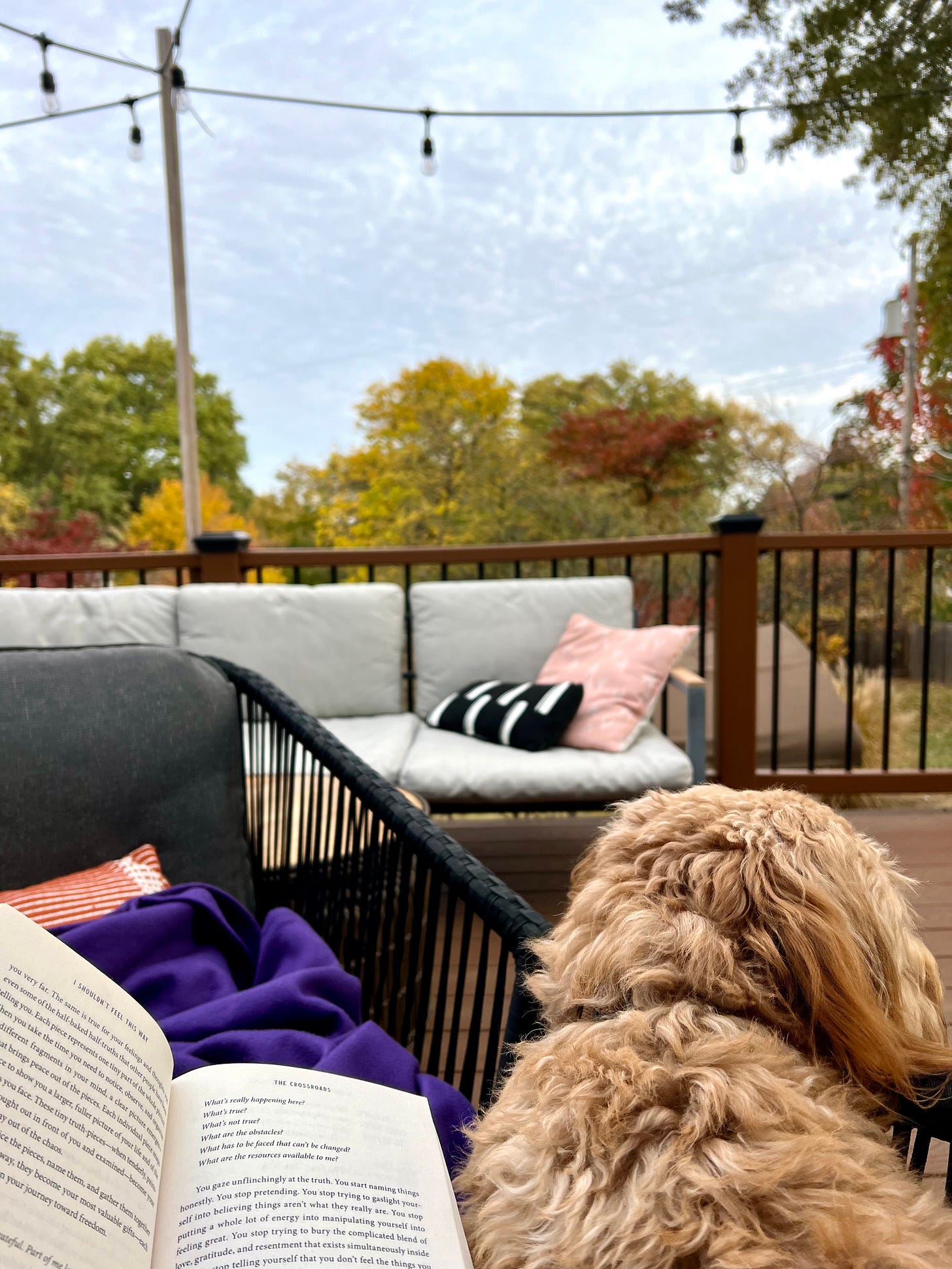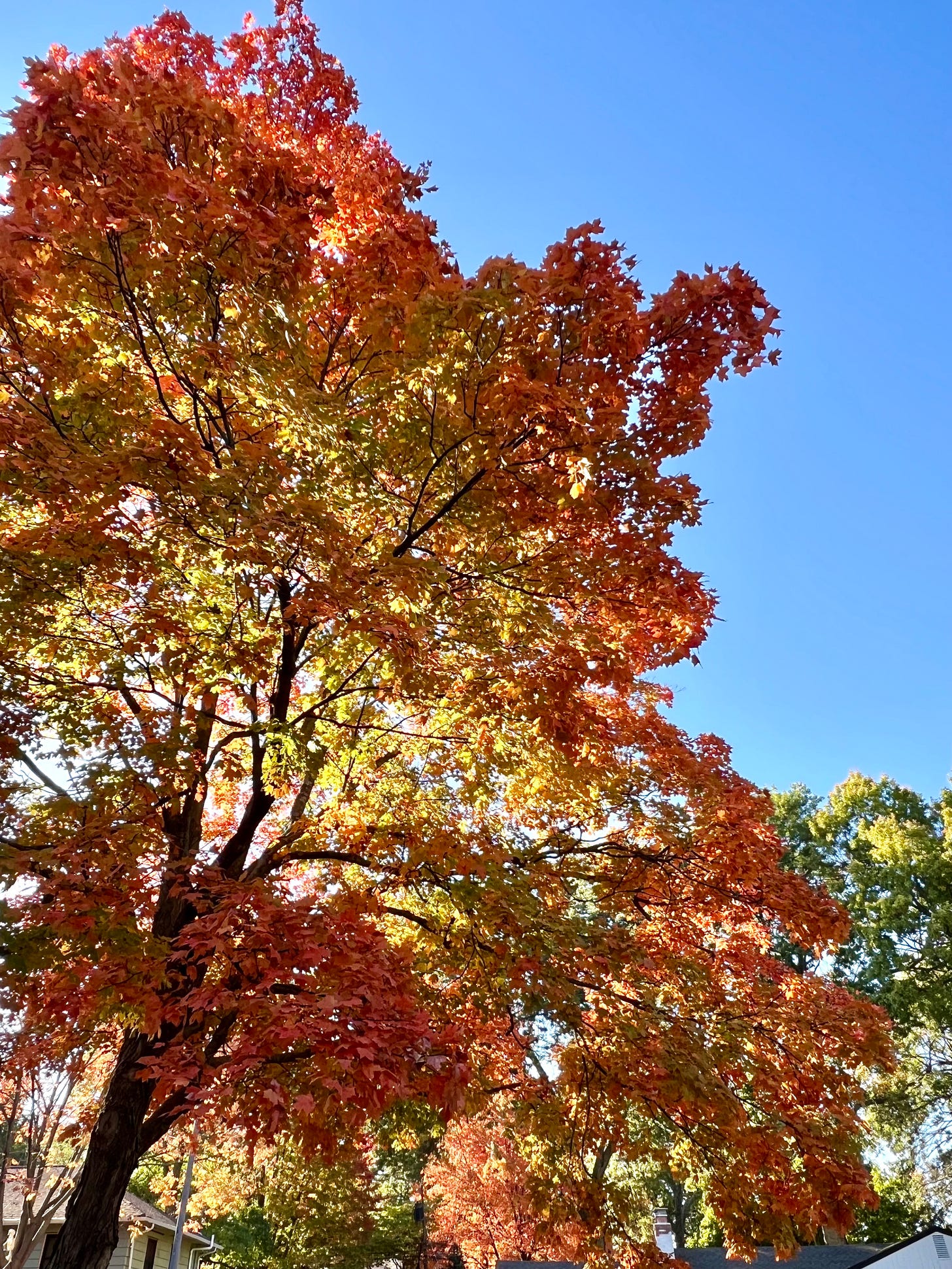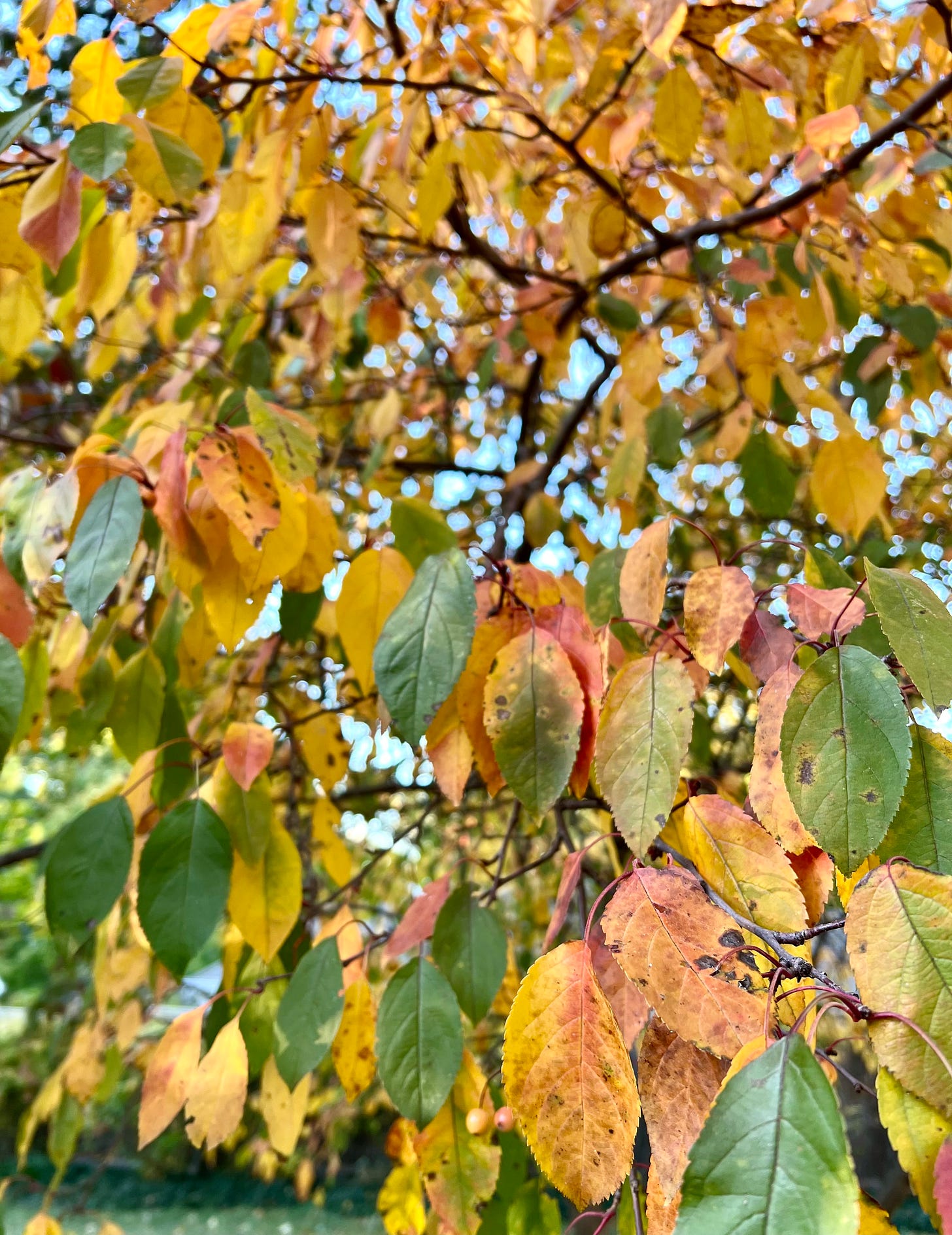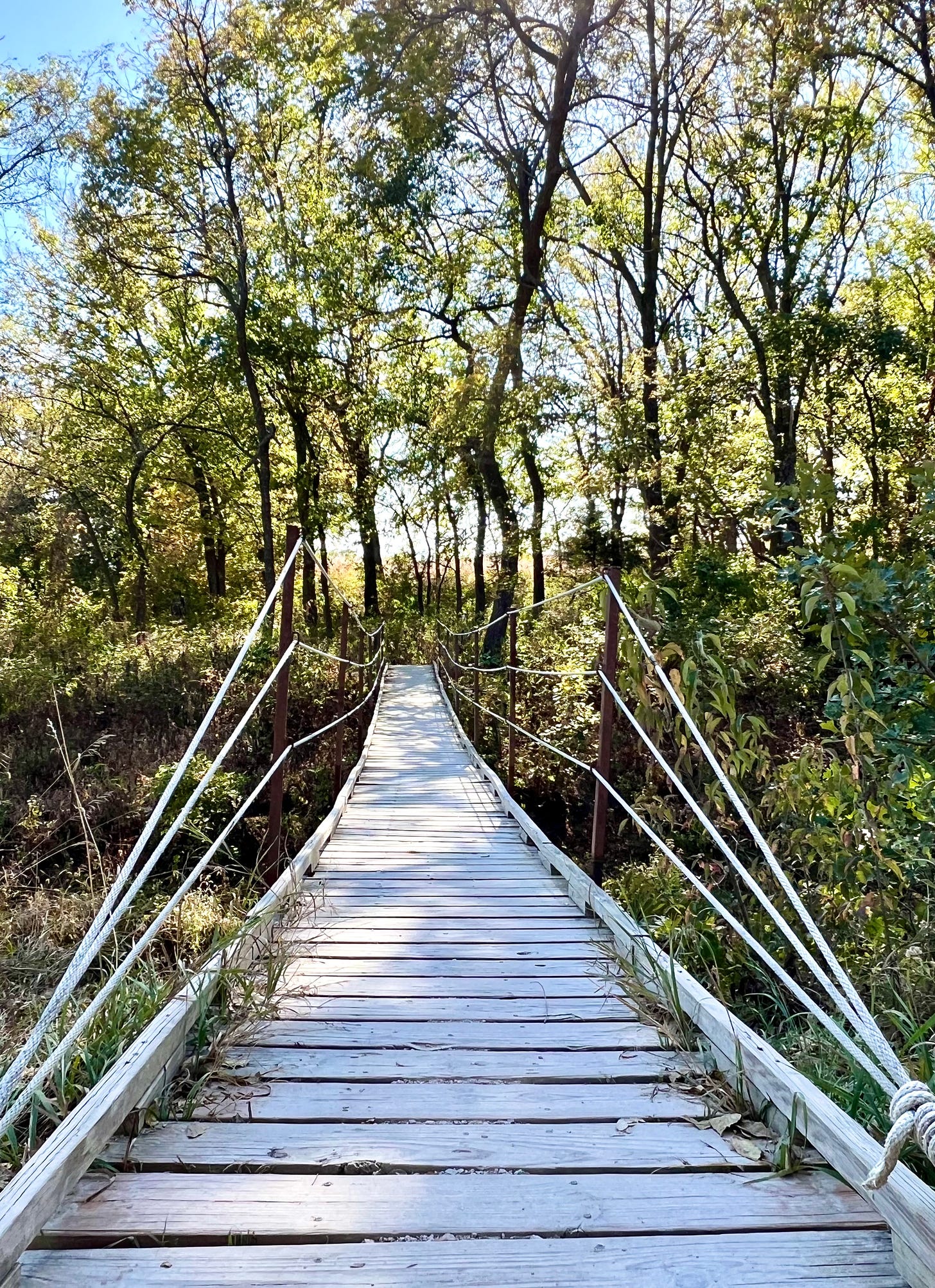Noticing & Naming: A Monthly Practice
Pursuing clarity and calm, doing the small thing, and protecting my energy
It’s hard to believe that October is over, but November is declaring itself today with clouds, cooler temperatures, and, of course, the election. While this post isn’t primarily election-focused, I found some through lines as I was writing it. I think noticing and naming what’s happening in our hearts, minds, and bodies will be important today and in the days to come.
Noticing keeps us grounded in the present rather than dwelling on the past or worrying about the future. Naming what we’re thinking and feeling helps us know and move toward what we need, whether that’s connection with someone we love, a nourishing meal, or a break from the news. As Dr. Alison Cook so astutely puts it:
“When you name what’s hard, you paradoxically find peace inside. You become the kind of person who brings real care to yourself and to other people. And you become an oasis of clarity and calm for a world in desperate need of it.”1
An “oasis of clarity and calm” sounds like exactly what we need this week. I hope these words offer you just a little more language as you seek to notice and name what’s true in your life. Thanks for being here.
Seven Things I Noticed
I’m trying to pay attention to the world around me and to the details of my days. Sometimes these observations may lead to bigger realizations, but other times, the act of noticing is enough. Here are seven things I noticed in October:
The trees I can see from our deck looked layered, like a painting set against a soft sky—tall green trees in the back row, bright yellow ones in the middle, and small red leaves showing off in the foreground.
The lazy lilting of a single leaf falling to the ground.
A guy juggling while skateboarding at the park. Later I saw him riding a unicycle. He seemed to be taking both endeavors very seriously. Who are you? I wondered. And what are you training for?
The word should circulated in my mind a lot last month.
The best question I heard all month came from an almost-four-year-old who asked: What’s your favorite kind of rainbow unicorn?
Marty found a new form of entertainment: tossing acorns in the air or swatting them with his paw and then bounding after them as they rolled off the deck.
All the election workers I encountered were kind and helpful. The man who led me to my ballot box made lighthearted jokes. A woman behind me thoughtfully answered a young voter’s questions. The man at the exit opened the door for us. “Thanks for voting early!” he said, smiling widely. “Spread the word—we’re here all week.”

Three Things I Named
I have a loud internal life, and naming what’s going on on the inside helps to quiet things down. When we can put thoughts and emotions into words, fear begins to lose its power, next steps come into focus, and we realize we’re not actually alone. Here are three things I named last month:
1. No two griefs are the same.
Even if you’ve faced a similar loss as someone else, you’re going to respond to it differently. I feel a strong pull to compare myself to other people, to morph to match someone else’s level of anger or pain. But, no matter how similar the circumstances, no two losses are exactly the same. No grief is a mirror image. I can empathize while also honoring my own experience.
2. Doing the small thing that I know I can complete is better than doing nothing.
I often think there is an elusive “best” way to do things, from completing a project to finding the “perfect” gift for someone I love. This tendency means I can sometimes put too much pressure on simple things that don’t warrant that kind of pressure. (It’s a really fun habit, let me tell you.)
October reminded me that doing the small thing that I know I can finish is better than overpromising, stressing myself out, or doing nothing (because it’s not the “best” thing). Maybe I don’t have the capacity to make a meal for someone this week, but I can buy them lunch or send a gift card. Maybe I don’t have time for a long phone call, but I can send a text. But here’s the kicker—I have to let go of what I think other people would do and be honest about my own capacity on any given day. Sure, someone else could probably do that thing without stressing about it. But if I can’t, or if I can’t today, I can accept my limits and do the small thing instead. This is absolutely a work in progress for me, but naming it helps me see it more clearly.
3. The thing I worry about is rarely what actually happens.
I spend a lot of mental and emotional energy imagining the future and trying to figure out how I’ll respond when we get there. But what actually ends up happening is often not what I imagined—sometimes drastically so. As a dear friend reminded me recently, maybe this is why we should take Jesus at his word when he says, “Therefore do not worry about tomorrow, for tomorrow will worry about itself. Each day has enough trouble of its own” (Matt. 6:34 NIV). It’s not a call to expect the worst. It’s a call to rest. To put down all the what ifs and accept that there’s no way we can see what’s coming. There are too many variables, too many unforeseen possibilities. And some of those possibilities may be really beautiful things we’ve never considered, which is good news for my anxiety-prone heart.
I wasn’t originally thinking about the election when I wrote this point, but it’s fitting. We don’t know what will happen by the time we crawl into bed tonight, let alone in the days, weeks, and months to come. It’s fair to be anxious, but we only have so much mental and emotional energy to give. So we keep taking deep breaths. We take breaks when we need to. We look for beauty to keep us soft. We care for ourselves and for the people in front of us. And we try to remember that we can’t predict the future in all its complexity. There will be hard things ahead, in this country and in our own lives, and yet, somehow—mysteriously—there will be goodness and love there too. One step at a time. Each day has enough trouble of its own.
Questions for Your Practice
What did you notice in October? Was there something beautiful, funny, or surprising?
What’s one small thing you can finish this week, even if it’s not the “best”?
Can you name what you’re thinking and feeling today? Try to be specific. In light of that, what’s one thing you can do to care for yourself?
Words That Resonated
In an effort to give us more language for our lives, here are two quotes that stuck with me last month.
“In times of deep darkness, the cairns that have kept me in the way of Jesus were the prayers and practices of the church. . . . Inherited ways of prayer and worship—liturgical practices—are a way that the ancient church built cairns for us, to help us endure this mystery, to keep us on this path of faith, to guide us home.” —Tish Harrison Warren, Prayer in the Night
“Love is a windbreaker, fashioned of people who sat and listened and got us tea, who did not run for their cute little lives when ours got dark. Who tucked us in. Who got us to our feet and back outside, reminding us to lift our eyes to the hills.” —Anne Lamott, Somehow

Thanks for reading! Remember that naming is an essential part of becoming “an oasis clarity and calm” for ourselves and others, and that may be especially important when things feel uncertain. With you as we work to care for ourselves this week.
The links to books are affiliate links, so I’ll receive a small commission if you end up purchasing any of them. Whether you buy them or find them at the library, all of these are well worth the read!
This quote is from I Shouldn’t Feel This Way by Dr. Alison Cook.








